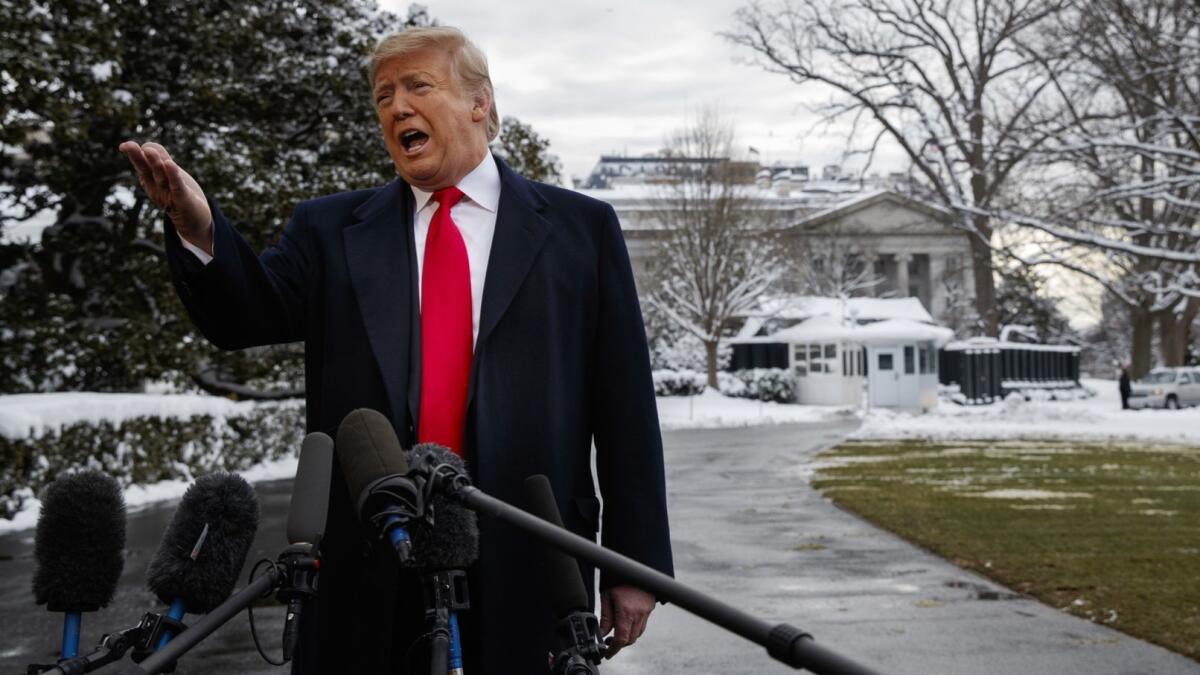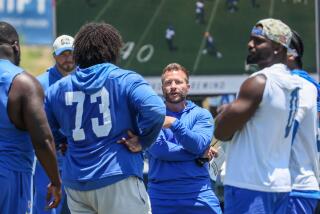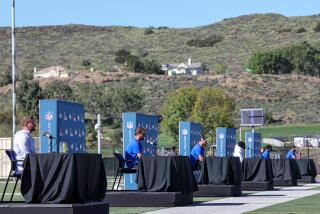Column: Rams should not visit the White House if they win the Super Bowl

Reporting from atlanta — On the quest to become one of Los Angeles’ most revered sports institutions, a victory Sunday in the Super Bowl is only the start. What comes after will be almost as important for the Rams.
If President Donald Trump invites them to the White House, they have to decline.
They shouldn’t go. They can’t go.
A Super Bowl winner from any market would have to deliberate such action because of the number of players who object to the President’s racially charged rhetoric and policies. Trump already canceled a scheduled visit by last year’s champion Philadelphia Eagles after many of their players said they wouldn’t attend.
The Rams have even more to think about.
They are part of a conservative league that is popular in conservative parts of the country, but they have to think about the city they represent. They have to think about the remarkable diversity of their unique fan base.
Los Angeles is the antithesis of Trump’s vision of America and if the Rams intend on becoming a symbol for the city, what they have to do is obvious.

Super Bowl week kicked off with Opening Night featuring the Los Angeles Rams, the New England Patriots and a few thousand media members and fans inside State Farm Arena in Atlanta.
The Rams were understandably reluctant to speak on the subject Tuesday, likely because doing so would be interpreted as a presumption of a victory over the New England Patriots.
“I think that the biggest thing is if we’re fortunate enough to win this game, then we talk about what’s next with regards to those steps and that’s exactly how we’ll approach it,” coach Sean McVay said. “The first thing is we have to win this game. And that’s going to be a great challenge for us, so that’s really kind of where we’re at.
Podcast: Dylan Hernandez gives a first-timer’s perspective from the Super Bowl »
“We’re solely focused on trying to win the game against an excellent football team that’s been doing it as well as anybody over the last handful of years. The luxuries or some of the opportunities that are presented as a result of winning are things that we will have to filter through as an organization after this.”
Players echoed their coach’s sentiments.
“We got to worry about preparing for the game first,” veteran cornerback Aqib Talib said.
“I haven’t really thought about it,” defensive tackle Michael Brockers said. “That will be after the game. We have to play the game first.”
Brockers is a football player, not an activist. But he said he viewed his platform, or even the expectations that he use that platform, as a privilege rather than a burden.
“You get to this point and I think that’s what everyone’s talking about,” Brockers said. “This is a platform for us to put out positivity, you know? My biggest thing is talking about autism. That’s what I represent. Autism speaks to my heart, that’s what I want to get out there and I want to help.”
When players were allowed to wear specially designed cleats to raise awareness for causes of their choice, Brockers chose to raise awareness for Autism Speaks, an advocacy organization.
Of course, championing autism research is something everyone will support. Political displays, such as turning down a White House invitation, can be more divisive.
“You can’t make everybody happy,” Brockers said. “If you do something, someone’s going to get mad. So you definitely have to be comfortable in your own skin and the person you are and what you stand for.”
Brockers said the Rams have players like that. He added that if the players are to ever voice their opinions on something as controversial as a White House visit, he was certain McVay would back them.
“Oh, for sure,” Brockers said. “That’s all about the communication. That’s what we love about him, for sure.”
If the Rams win Sunday and Trump reaches out to them, more than the players will be involved in the discussion. Something of this magnitude would be an organizational decision.
Chief operating officer Kevin Demoff declined comment, but history indicates whatever the players decide could be supported by owner Stan Kroenke.
Kroenke donated $1 million to the Republican National Committee toward Trump’s inauguration. However, shortly after Trump said in 2017 that NFL owners should fire players who don’t stand for the anthem, Kroenke released a statement supporting players’ freedom to protest.
“The Los Angeles Rams, our fan base and our city are all comprised of people from a variety of backgrounds and beliefs,” part of Kroenke’s statement read. “When we recognize that this diversity is our strength and seek to understand different perspectives, we are more enlightened and empathetic human beings. Our organization is committed to celebrating diversity, inclusion and respect, values that help define Los Angeles.”
Sign up for our daily sports newsletter »
The Dodgers already have protested Trump, albeit in relative silence. When the team visited Chicago in 2016, first baseman Adrian Gonzalez refused to stay with the other players in the Trump International Hotel and Tower. The Dodgers have not stayed at the property since.
The Rams could be next.
In their third season back in Los Angeles, the Rams became a source of strength and inspiration for the area in the aftermath of the Borderline shooting and Woolsey Fire. They showed how sports can unify a city, even one that is large and decentralized. The Rams could be a victory away from an opportunity to make another statement. They should know what that statement will be.
Follow Dylan Hernandez on Twitter @dylanohernandez
More to Read
Go beyond the scoreboard
Get the latest on L.A.'s teams in the daily Sports Report newsletter.
You may occasionally receive promotional content from the Los Angeles Times.











